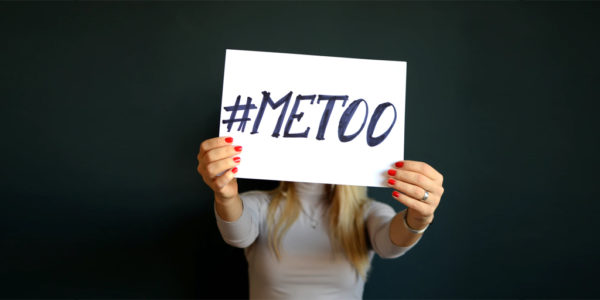By Youth Ambassador Meg Kneafsey
The Trade Unions Congress has released a report on sexual harassment giving a voice and credence to the masses of women complaining about their experiences at work.
More than half of all women have experienced sexual harassment at work. Indeed, women across social media have been inspired to share their stories using the hashtag #HarassmentAtWork. It is an uncomfortable read for anyone but disturbingly young women aged 18-24 were most at risk with two-thirds reporting sexual harassment at work. It seems that instead of being tackled in the new generations, it is actually getting worse.
As a young woman myself entering the work place, I have seen that this is part of a wider problem of sexual discrimination in the workplace. I decided to chat to other young women to see their reaction to this report, discuss their experiences, and listen to their ideas on what we can do to tackle this dreadful issue. I found, like myself, many were unsurprised by the report’s findings and sometimes recounted their own experiences. Although many did not want to be named in this piece, for fear of appearing ‘troublesome’ to current and future employees, a few wanted to share their opinions.
Chelsea, 18
“I have never seen or experienced sexual harassment in the workplace personally, however, I strongly believe that it is disgusting how often it happens. Reading the report made me question why women are still sexualised and stereotyped as typically “easy” and unable to do the same thing as men. It amazes me that people ask “what did you have to do for that” when women succeed, implying they used their sexuality to win.
I believe that ‘banter’ has a line and once it’s crossed there needs to be enforced consequences any individual that has sexually harassed a colleague.”
Zoe, 23
“I’m unsurprised by these reports. While fortunate enough to have not experienced it first-hand, I have heard my friends’ terrible stories. I believe more needs to be done to break the silence and ensure women can come forward.
From a young age women are taught that they are emotional and have a tendency to be paranoid. They are taught to remain demure and silent. When they use their voice, they are accused of being bossy or talking too much. Come adulthood when young women entering the workplace, they are suddenly unsure what behaviour is acceptable. They don’t know if they’re being oversensitive and are scared of being too assertive. We need to have a cultural shift that educates everyone on acceptable behaviour and encourages young women to use their voice and be heard.”
Jade, 21
“Not only do women have a glass ceiling standing in their way – old boys’ networks where unconscious bias against women rules the day- but those of us who make it into even prestigious workplaces will have to contend with behaviour that makes us unwelcome and uncomfortable, unworthy and unequal. This report also confirms to young women the horror stories they hear, and unfortunately they may decide to stop pursuing their ambitions.
Real, concrete action has to be taken. Not just legislative, but cultural. We have to ensure this report is shared with workplaces throughout the UK, so that employees and employers are made more aware of those acting in inappropriate ways. We also need to ensure strong trade unions and workers’ rights, including an established process for complaints. Indeed, trade unions must be at the heart of the workplace in tackling discrimination. We must empower female workers.”
S., 21
“On reading the statistics I felt a familiar pang of hopelessness but no surprise at all. Though I’m lucky enough to never have been affected by harassment in the workplace yet, I know too many women who have. This indicates a much deeper problem within our society. Our boys need to learn from a young age that lad culture is neither cool nor harmless; employers who employ young women and place them in situations where they are at risk of abuse must take the necessary steps to keep them protected; and above all, the people carrying out the harassment must be taught that their actions will never go unpunished. I think long-term change is possible with a massive attitude change, but we must work together and raise awareness to make that happen.”
As disheartening as this report is, it brings to light the everyday experiences of women. It is important to investigate these instances and ensure that women have their complaints heard and taken seriously. Employers have a responsibility to protect their workers and sexual harassment is a form of discrimination under the Equality Act 2010. If you find yourself in this position, you do not have to accept it. If speaking to your employer has failed or is impossible, you can ring the Equality Advisory Support Service.
There are also many organisations currently addressing the issue through lobbying governments and employers and giving women a voice. One of these organisations that addresses sexual harassment, The Young Women’s Trust, said:
“It is shocking that the majority of young women have been unable to do their job free from sexual harassment, and saddening that so many of those who have been sexually harassed felt it would negatively impact upon their career if they reported it. That’s why this important new survey from the TUC must act as a wakeup call to employers up and down the country, who shouldn’t assume that because harassment isn’t being reported to them it isn’t happening. Much more must be done to create workplaces where sexual harassment isn’t tolerated, and where those have experienced it are taken seriously and supported when they do report it.”
Unfortunately, gender discrimination in the workplace of all types still appears to be prevalent. It’s important that women, and particularly young women, are aware of their rights and understand that they are not alone. This is not a reality we have to accept. With the support of both genders, employers and employees, and the government, we can address this issue head-on ensuring that everyone can feel safe at work.







